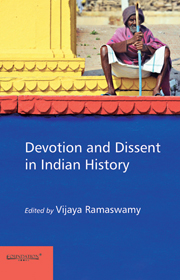Book contents
- Frontmatter
- Dedication
- Contents
- List of Tables and Figures
- Foreword
- Preface
- Introduction: Locating Devotion in Dissent and Dissent in Devotion A Thematic Overview
- Introduction
- 1 Parsing of Devotion and Dissent
- 2 Dissent and Protest in Early Indian Buddhism with Special Reference to Devadatta
- 3 Devotion and Dissent in Hunter's Bhakti
- 4 Devotion and Dissent
- 5 Dissent Within
- 6 Women in Love
- 7 Dissenting Voices
- 8 Dissent in Kabir and the Kabir Panth
- 9 Devotion and Dissent of Punjabi Dalit Sant Poets
- 10 Protest and Counter-protest
- 11 Fakirs of Bengal
- 12 Music in Chishti Sufism
- 13 Dissenting the Dominant
- 14 Devotion and Dissent within the Catholic Church in Late Colonial Bengal
- 15 Narratives of Travel, Voices of Dissent and Attacks on the Colonial Church Fabric of the European Missionaries
- 16 Devotion and Dissent in Narayana Guru
- 17 Sree Narayana Guru's Idioms of the Spiritual and the Worldly
- Contributors
- Index
12 - Music in Chishti Sufism
from Introduction: Locating Devotion in Dissent and Dissent in Devotion A Thematic Overview
Published online by Cambridge University Press: 05 October 2014
- Frontmatter
- Dedication
- Contents
- List of Tables and Figures
- Foreword
- Preface
- Introduction: Locating Devotion in Dissent and Dissent in Devotion A Thematic Overview
- Introduction
- 1 Parsing of Devotion and Dissent
- 2 Dissent and Protest in Early Indian Buddhism with Special Reference to Devadatta
- 3 Devotion and Dissent in Hunter's Bhakti
- 4 Devotion and Dissent
- 5 Dissent Within
- 6 Women in Love
- 7 Dissenting Voices
- 8 Dissent in Kabir and the Kabir Panth
- 9 Devotion and Dissent of Punjabi Dalit Sant Poets
- 10 Protest and Counter-protest
- 11 Fakirs of Bengal
- 12 Music in Chishti Sufism
- 13 Dissenting the Dominant
- 14 Devotion and Dissent within the Catholic Church in Late Colonial Bengal
- 15 Narratives of Travel, Voices of Dissent and Attacks on the Colonial Church Fabric of the European Missionaries
- 16 Devotion and Dissent in Narayana Guru
- 17 Sree Narayana Guru's Idioms of the Spiritual and the Worldly
- Contributors
- Index
Summary
Kushtagan-i khanjar-i taslim ra
Har zaman as ghayb jaan-i digar ast
[The victims of the dagger of submission
Get a new life from the unseen every moment]
Khwaja Qutb-ud-Din Bakhtiyar Kaki, a music aficionado and second in a chain of five great Chishti Sufis who flourished in the Delhi Sultanate in the thirteenth and fourteenth centuries, died in 1235, after bouts of ecstasy caused by the above couplet recited by the qawwal in a mahfil-i-sama, music assembly, organized by the Khwaja himself. Chishti memory recounts that the Khwaja was in rapture for over three days, and every time he would regain consciousness, he would ask the qawwal to recite the same couplet. Eventually, the Khwaja breathed his last in that state of bliss, ascending to the heaven in anticipation of achieving union with his beloved Allah. He was buried at a site selected by him in advance and the shrine soon became a major centre of pilgrimage. This was a perfect finale to a Muslim mystic's career devoted to God, marked by night-long prayers and meditation, a refined taste for poetry and music, an informed understanding of the classical traditions of Islam and occasional performance of miracles either as an expression of benevolence towards the faithful or to silence the antagonists, especially the aggressive Sunni Hanafi ulama of the Delhi Sultanate, who sought to censor the ways of the Sufis. It was no coincidence that the five great Chishti masters and the later upholders of Chishti traditions shared their love for poetry and music as central to their spiritual activities.
- Type
- Chapter
- Information
- Devotion and Dissent in Indian History , pp. 274 - 290Publisher: Foundation BooksPrint publication year: 2014



